|
|
|
Sort Order |
|
|
|
Items / Page
|
|
|
|
|
|
|
| Srl | Item |
| 1 |
ID:
082512
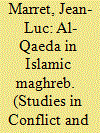

|
|
|
|
|
| Publication |
2008.
|
| Summary/Abstract |
There are many conditions that push local terrorists groups toward internationalization. Similarly, many local conditions and roots seem to continue to influence groups. The current literature on terrorist groups has sometimes neglected to analyze this double phenomenon of internationalization and local roots. With a concrete assessment of the recent violence in Algeria, this article demonstrates that GSPC/Al Qaeda in Islamic Maghreb is a good example of this dual nature, mixing local and global (e.g., "glocal"1), traditional and imported practices, and high- and low-tech technologies
|
|
|
|
|
|
|
|
|
|
|
|
|
|
|
|
| 2 |
ID:
108244
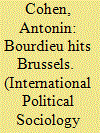

|
|
|
| 3 |
ID:
161566
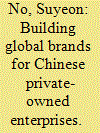

|
|
|
|
|
| Summary/Abstract |
While most private-owned enterprises (POEs) in China are engaged in subcontracting or do not own the product brands, the number of POEs with their own brands has increased rapidly, while some are even globally recognized. Since these POEs face high opportunity costs for own branding, given their dominant presence in the global subcontracting community, their own branding actions require contextual understanding of doing business in China. This study starts with the notion of how these POEs shift from subcontracting to own branding, and explores their respective own branding paths. We interviewed seven Chinese POEs in the fashion industry in Zhejiang Province: Babei, Baili, Sunrise, Aokang, Youngor, Kangnai, and JNBY. The case studies suggest how these firms built their brands in the global market, and why their trajectories differentiated in the course of own branding. Our study configures three types of own brand models for POEs: the competitive subcontracting, the toehold, and the home-linked organic models. POEs can continue subcontracting in their core business, while implementing own branding through diversification. Alternatively, they can segregate markets, pursuing own branding in one group of countries, while subcontracting elsewhere. In addition, they may establish wholly owned enterprises, and introduce their brands in a way that preserves their home market advantages. We identify two stimuli for Chinese POEs’ global branding choices. Global branding strengthens domestic position as it becomes a signal for reputation. As the online platform reduces costs for global branding, and becomes popular, POEs are more likely to pursue global branding to become more competitive in the domestic market. Many POEs also continue to collaborate with the previous customers through strategic inter-dependence, such as distribution channel exchange.
|
|
|
|
|
|
|
|
|
|
|
|
|
|
|
|
| 4 |
ID:
095343
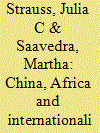

|
|
|
| 5 |
ID:
071480
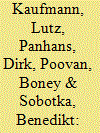

|
|
|
| 6 |
ID:
102719
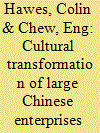

|
|
|
|
|
| Publication |
2011.
|
| Summary/Abstract |
The Chinese government has recently introduced a policy requiring all large Chinese business corporations to transform their corporate cultures with the aim of increasing their competitiveness on the international stage. This paper traces the origins of the policy to the outstanding performance of a small number of Chinese firms since the late 1980s, a phenomenon attributed by the CEOs of these firms to effective implementation of cultural values change among their workforces. We give detailed accounts of two such firms, Haier Group and Huawei Technologies, demonstrating how they have utilized cultural management techniques to improve their employees' performance. We also identify some negative aspects of their approach to cultural management that may impede these firms in their efforts to become truly international corporations.
|
|
|
|
|
|
|
|
|
|
|
|
|
|
|
|
| 7 |
ID:
108698
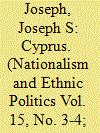

|
|
|
|
|
| Publication |
2009.
|
| Summary/Abstract |
This article provides an essential background to the domestic setting of the conflict in Cyprus and some of its international repercussions. In doing so, emphasis is placed on the geographical, historical, social, cultural, institutional, and political roots of the conflict. The presentation and analysis of these aspects aims at examining the relationship between political division along ethnic lines and the generation and internationalization of the conflict. It places some emphasis on the factors that contributed to the maintenance and reinforcement of ethnic cleavages in a bicommunal society and the failure of the political system to counteract divisive forces.
|
|
|
|
|
|
|
|
|
|
|
|
|
|
|
|
| 8 |
ID:
120615


|
|
|
|
|
| Publication |
2013.
|
| Summary/Abstract |
Research on potential diversionary uses of military force continues to generate widespread scholarly attention. New measures, novel databases, and an increasing internationalization of this research examine the kinds of targets an American president may strike. Yet in many respects, Levy's insight on research of diversionary military action(s), that quantitative research approaches fail to capture the decision-making dynamics involved in a military action, has generally held true. Current analysts still struggle to develop a consensus on the conditions that help explain a diversionary military action, or whether such military actions ever even occur.
Using a diversionary-war model created from previous case-study analyses this research examines American military actions in Grenada in 1983 and Iraq in 1996 to determine whether or not these strikes appear to be diversionary in nature. Our model also employs previous research on diversionary military action to assist in the selection of American military actions, followed by a series of tests to assess various aspects of the decision-making process, international interaction prior to and after the strikes, and the strategic merits for conducting these strikes. Our research generally suggests that neither of these strikes was conducted for diversionary purposes.
|
|
|
|
|
|
|
|
|
|
|
|
|
|
|
|
| 9 |
ID:
124564


|
|
|
|
|
| Publication |
2013.
|
| Summary/Abstract |
We empirically analyze the host-country determinants of Chinese outward direct investments (ODI) in the period from 2003 to 2008, using disaggregated data by country and sector and distinguishing between state-owned or controlled enterprises (SOEs) and privately-owned firms. Our results show that the pattern of Chinese ODI differs according to corporate ownership. Private firms are attracted by large markets and host-country strategic assets and are averse to economic and political risks when choosing investment locations abroad. Differently, state-owned or controlled enterprises follow the strategic needs of their home country and invest more in natural resource sectors, being largely indifferent to the political and economic conditions in the host countries.
|
|
|
|
|
|
|
|
|
|
|
|
|
|
|
|
| 10 |
ID:
118247
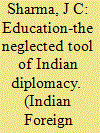

|
|
|
| 11 |
ID:
189691


|
|
|
|
|
| Summary/Abstract |
Universities played a central role in Egypt’s 2011 revolution and were heavily affected by the subsequent return to military rule. Egyptian universities have a long history as settings where young activists engage in political action. Today they are institutions with a changing role and scope. The expansion of private, for-profit institutions of higher education over the past decade has called into question the traditional model of public universities with access guaranteed by the state, while campuses have been largely silenced as forums of activism.
|
|
|
|
|
|
|
|
|
|
|
|
|
|
|
|
| 12 |
ID:
092410
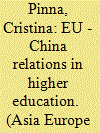

|
|
|
|
|
| Publication |
2009.
|
| Summary/Abstract |
The internationalization of higher education systems has become critical to the educational success of a country. The purpose of this research is to carry out a study of the growing pace of internationalization in Chinese higher education in the contemporary period. The research focuses on the cooperation between China and Europe, especially the management of transnational projects related to improving collaboration between Chinese and European institutions of higher education. The move to mass higher education in the Chinese context and its implications stand as the starting point of the investigation. The project aims to analyze the main national policies for enhancing the internationalization of higher education both in China and Europe. Then, taking as examples some projects of particular relevance, it will consider the objectives and the consequences of these forms of cooperation and collaboration, especially for the development of the Chinese higher education system. Finally, a concise historical overview of the relations in higher education between China and Europe in the last 20 years will facilitate understanding of the changing role played by Europe in the Chinese context.
|
|
|
|
|
|
|
|
|
|
|
|
|
|
|
|
| 13 |
ID:
072150
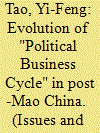

|
|
|
| 14 |
ID:
133856


|
|
|
|
|
| Publication |
2014.
|
| Summary/Abstract |
Construction of a high-speed railway linking Europe, Asia, Africa and North and South America is a serious proposal that will profoundly impact international relations. Discussion of the internationalization of high-speed rail transportation is being led from the advanced position of China's well regarded achievements in this field. Global geopolitics and traditional geopolitics theories will also undergo revolutionary changes as cooperative planning proceeds.
|
|
|
|
|
|
|
|
|
|
|
|
|
|
|
|
| 15 |
ID:
138327
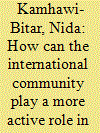

|
|
|
| 16 |
ID:
124527
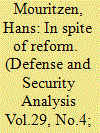

|
|
|
|
|
| Publication |
2013.
|
| Summary/Abstract |
Security Intergovernmental Organizations, here illustrated by NATO, persist in a "permitted interval" of internationalization, i.e. permitted by its member-states. On the one hand, they are seldom or never permitted to vanish due to member-states' vested interests in retaining them as tools of statecraft, even if their original purposes have become redundant. On the other hand, there is an internationalization ceiling that they must respect: they should not become too autonomous and thereby no longer be suitable as member-state tools. In spite of post-Cold War reform, interviews carried out at NATO Headquarters (HQ) in the late 1980s compared to interviews in 2012 display that a continuous pulling and hauling of forces of internationalization and renationalization have taken place around NATO HQ. The only instance of clear internationalization can be observed in the proactive diplomacy of Secretary General Fogh Rasmussen. There is stiff opposition to the internationalization of abolishing the Military Committee/International Military Staff among minor and South European states, and there is no waning in states' attempts to micro-manage the International Staff. Only external shocks can overcome resistance to internationalizing reform.
|
|
|
|
|
|
|
|
|
|
|
|
|
|
|
|
| 17 |
ID:
190962
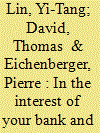

|
|
|
|
|
| Summary/Abstract |
This article examines China’s path to joining the International Chamber of Commerce (ICC), a private international organization founded in Paris in 1920, of which China was a member from 1931–1949 and from 1994 onwards. The article charts the actors and debates behind two meaningful encounters. The first took place while the Nanjing government was raising funds for economic reconstruction, and the ICC aimed to mediate China’s fundraising efforts through private multilateral channels. The second was in the 1980s, when the People’s Republic was seeking to enter the world trade system. ICC members acted as educators and facilitators of world trade practicalities for the People’s Republic, which eventually rejoined the ICC in 1994. The article draws on Chinese, European, and American source material collected from governments, chambers of commerce, and private businessmen to make a twofold contribution. First, it adds nuance to the narrative of China’s economic internationalization by identifying an important non-governmental diplomatic channel. Second, it questions the ICC’s self-proclaimed identity as a non-political economic organization by showing how the political was indissociable from the economic when it came to China’s membership.
|
|
|
|
|
|
|
|
|
|
|
|
|
|
|
|
| 18 |
ID:
138324
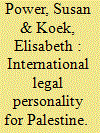

|
|
|
| 19 |
ID:
127483
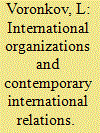

|
|
|
|
|
| Publication |
2013.
|
| Summary/Abstract |
SOVEREIGN STATES traditionally build their relationships with external actors and partners in the interest of creating a favorable international environment for the effective achievement of national goals. The foreign policy of states performs a very important, but mainly an auxiliary function in dealing with their internal problems.
In recent decades, due to the growing interdependence of modern states, the internationalization of their life and the deepening of globalization processes, the significance of international factors for successfully dealing with national matters of individual states has increased markedly. International and domestic aspects of their policies are becoming more organically interlinked. This induces states to look for ways to raise their role in shaping a favorable international environment for national development.
|
|
|
|
|
|
|
|
|
|
|
|
|
|
|
|
| 20 |
ID:
161728
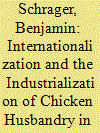

|
|
|
|
|
| Summary/Abstract |
This article analyzes how strategies for capitalist accumulation drove the industrialization of chicken husbandry and increased consumption of chicken products in Japan. By the start of the Showa era, leaders in the Japanese chicken industry sought to promote larger and more productive operations through the adoption of Western breeds. Following the upheaval of World War II, the US facilitated three major changes for Japanese chicken husbandry: expanded grain exports from the US in the 1950s; the importation of specialized breeds in the 1960s; and the Japanese industry’s emulation of American corporations in the 1970s. The connections between Mitsubishi and KFC-Japan illustrate how Japanese firms implemented new organizational structures that allowed them to profit from the chicken industry in multiple ways. I suggest that the increases in consumption of chicken meat and eggs in the Japanese diet indicate the advancement of capitalist strategies for overcoming the barriers to industrialization.
|
|
|
|
|
|
|
|
|
|
|
|
|
|
|
|
|
|
|
|
|